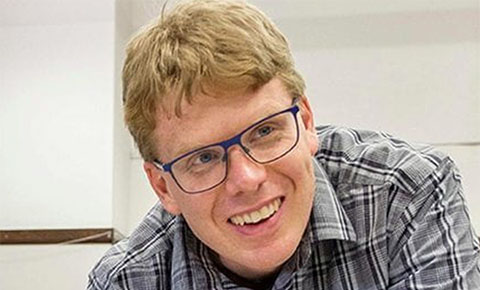Mike Horn Promoted to Full Professor
 Michael Horn, whose research has modernized museums and introduced musical approaches to coding, has been promoted to full professor at Northwestern University’s School of Education and Social Policy.
Michael Horn, whose research has modernized museums and introduced musical approaches to coding, has been promoted to full professor at Northwestern University’s School of Education and Social Policy.
Horn is best known for creating interactive museum exhibits and using emerging technology to help people learn. A professor of both learning sciences and computer science, he has designed and assessed a range of projects, from a hands-on computer programming language used in science museums and early elementary school classrooms to multi-touch tabletop exhibits for natural history museums.
Most recently, he developed a powerful new way to create music that that can be linked with digital production tools of the future. He details the process in his new book, Introduction to Digital Music with Python Programming: Learning Music With Code.
A beginner’s guide to the increasingly intertwined world of music and code, the book uses Horn’s TunePad, which let users create short musical loops that can be layered together using a simple digital audio workstation interface.
“Code gives us an elegant language to think about musical ideas,” Horn said. “Music is a great way to learn core programming concepts. Together they reinforce one another is surprising and potent ways that open new creative opportunities.”
Horn, director of the Tangible Interaction Design and Learning (TIDAL) Lab, is the program coordinator for the Learning Sciences doctoral program and a co-founder of the joint doctoral program in computer science and learning sciences between the School of Education and Social Policy and the McCormick School of Engineering.
In March, Horn’s TunePad received a National Science Foundation grant to study coding at the intersection of music, art, and the programming language Python with the McGaw YMCA’s MetaMedia program in Evanston, Ill.
The TunePad platform has been used with thousands of students from 3rd grade to college in a wide range of informal and formal education spaces. TunePad also features an innovative computational notebook structure called Playbooks to support creative musical expression, including live performances. (Computational notebooks allow code to be embedded into text.)
Early research results suggest the system is a good way to “flexibly support a variety of creative workflows,” Horn wrote in a recent paper, TunePad Playbooks: Designing Computational Notebooks for Creative Music Coding.
For Horn, coding has long been a way to help revitalize subjects that have become “painfully rote” in schools. As a child growing up in Houston, Horn played the viola, but he said he memorized the songs and never fell in love with music.
“While I could read music, I never learned to read music as literature, never composed anything not even informally scratching out a tune, and I never developed habits of deep listening,” he said. “I never played just for fun.”
Learning how to code was a completely different and transformative experience. He was self-taught, took electives that he chose himself, spent hours working on games or other projects, planned out algorithms and even synthesized his own rudimentary sound effects. “I had no idea what I was doing, but that was liberating,” he said. “I fell in love with coding.”
Developing TunePad over the past several years helped Horn rediscover the power of musical ideas. “Code has given me a different kind of language for thinking about things like rhythm, chords and harmony,” he said. “Music has become something creative and alive in a way that it never was for me before.”
Horn is co-editor-in-chief of the International Journal of Child-Computer Interaction and an associate editor for the Journal of the Learning Sciences.
His work has been exhibited at museums around the world including the California Academy of Sciences (San Francisco), the Museum of Science (Boston), the Field Museum (Chicago), and the Computer History Museum (Silicon Valley). One of his most popular papers, which he co-wrote with School of Education and Social Policy professor Uri Wilensky, explored how to define computational thinking for math and science classrooms.
Horn earned his doctorate in computer science at Tufts University where he worked in both the Human-Computer Interaction Lab and the Developmental Technologies research group. He received his undergraduate degree in computer science from Brown University. He has also worked as a software engineer for Classroom Connect and iRobot Corporation.